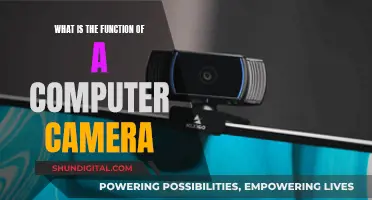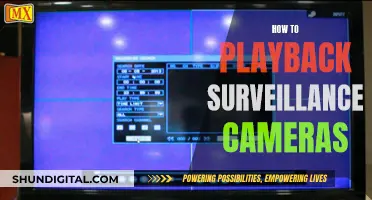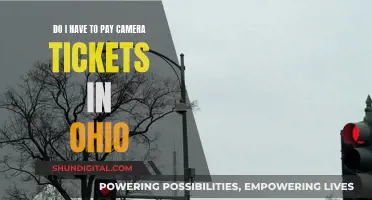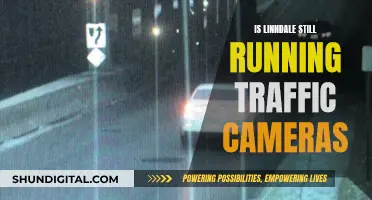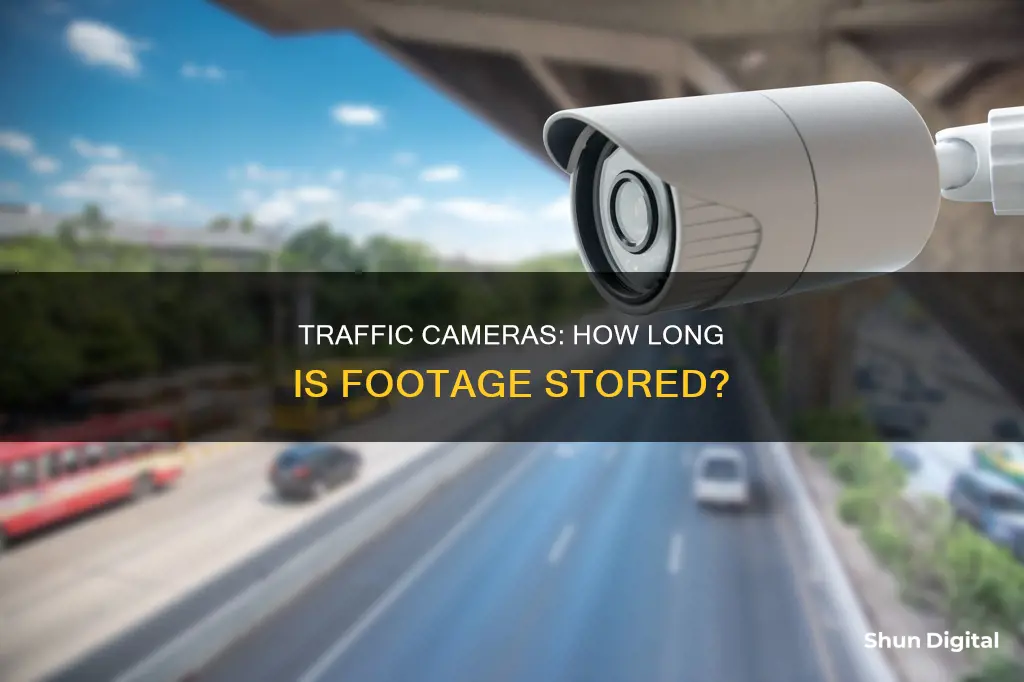
Traffic camera footage can be a valuable resource in the aftermath of a car accident, but it's often only stored for a limited time before being overwritten or erased. The retention period for traffic camera footage varies, but it typically ranges from 30 to 90 days. In some cases, footage of alleged violations captured by red light or speed cameras may be available for viewing for up to two years. However, it's important to act quickly if you need to access this footage, as some vendors and organizations only retain their camera footage for a matter of hours. Obtaining traffic camera footage often requires the assistance of an attorney, who can help ensure that any relevant footage is preserved and obtained in a timely manner.
| Characteristics | Values |
|---|---|
| How long is footage kept? | Between 30 and 90 days, sometimes as little as 72 hours |
| How long are alleged violations kept? | Up to 2 years |
| How long do you have to contest a ticket? | Set amount of time |
What You'll Learn

Traffic camera footage is typically stored for 30-90 days
Traffic camera footage is typically stored for 30 to 90 days. This limited retention period underscores the importance of acting promptly when seeking to obtain footage of a car accident or traffic violation. The specific retention period can vary depending on the type of camera and the location. For instance, in Chicago, footage of intersections with cameras is available for 30 days, while alleged violations captured by red light or speed cameras can be viewed for up to two years.
The process of requesting traffic camera footage also depends on the type of camera and the responsible entity. For government-owned traffic cameras, such as red light or speed cameras, you may be able to access the footage directly through a website or by requesting it from the relevant government agency. However, some agencies may require a subpoena before releasing any footage. In such cases, it is advisable to seek the assistance of an experienced attorney, who can help ensure that any relevant footage is preserved and obtained for use as evidence.
For private surveillance cameras, such as those owned by businesses or homeowners, you would need to contact the owner directly and request that they preserve and provide the footage. Again, a subpoena may be required, and an attorney can assist in this process.
It is worth noting that some camera systems may overwrite old data after a certain period, so it is crucial to act quickly to increase the chances of successfully obtaining the desired footage. Additionally, while camera footage can be valuable evidence in car accident cases, it should be handled carefully as it may have implications for personal injury claims. Consulting with an attorney who can guide you through the process of obtaining and utilising the footage to support your claim is always recommended.
Car Cameras in Mississippi: Are They Legal?
You may want to see also

Some alleged violation footage is available for up to two years
The retention period for traffic camera footage varies depending on the type of footage and the location. In Chicago, footage of constant streams of intersections with cameras is available for 30 days. Notably, alleged violation footage is treated differently and is available for up to two years. This extended retention period provides a valuable opportunity to review and analyse traffic incidents, identify responsible parties, and support insurance claims and legal proceedings.
The ability to access and utilise this footage is time-sensitive and often challenging. The process for requesting footage varies, and specific information such as ticket number and license plate number may be required. In some cases, the assistance of an attorney is necessary to navigate the complexities of obtaining footage from various entities, including municipalities, police agencies, and private businesses.
It is worth noting that traffic camera footage is not the only source of evidence for traffic incidents. Additional sources, such as private business surveillance cameras, dash cameras, and even witness cellphones, can provide crucial evidence. However, similar to traffic camera footage, obtaining footage from these sources may also be subject to time constraints and legal procedures.
The availability of alleged violation footage for up to two years underscores the importance of promptly initiating the process of securing relevant footage. Working with legal professionals who understand the intricacies of evidence collection can be instrumental in successfully obtaining and preserving this time-sensitive information.
Understanding Lorex Camera's Backlight Mode
You may want to see also

Footage is often overwritten or erased
Traffic camera footage is often stored for a limited time only and overwritten or erased after a certain period. This period can vary, but it is typically between 30 and 90 days. This means that those seeking to obtain traffic camera footage must act quickly. In some cases, footage may only be kept for as little as 72 hours before being deleted or recorded over. This is why it is crucial to begin the process of requesting video evidence as soon as possible after an accident.
The process for requesting traffic camera footage can vary depending on the type of camera and the entity that owns it. For example, traffic cameras and red-light cameras are typically owned by government agencies or municipalities, while private businesses own their own surveillance camera footage. Obtaining footage from highway traffic cameras and red-light cameras without the help of an attorney can be difficult, as these entities may have specific requirements for releasing footage and are not obligated to provide it to the general public. However, an attorney can issue a subpoena to seek the release of the footage.
It is important to act quickly when requesting traffic camera footage, as these cameras often erase old data after a certain period. If you are unsure of the location of the accident, tools such as Google StreetView can be used to identify potential sources of video evidence. In some cases, a simple request for footage may be sufficient, especially for private businesses, but a formal subpoena may be required for government-owned cameras. Working with an experienced attorney can increase the chances of successfully obtaining the desired footage.
To ensure the preservation of relevant footage, it is recommended to send a "Spoliation Letter" to the person, business, or entity that controls the camera. This letter should identify the date, time, location, and a demand that the video be preserved in anticipation of litigation. It should be sent via certified mail to confirm receipt. By taking prompt action and following the necessary steps, individuals can increase their chances of obtaining valuable traffic camera footage before it is overwritten or erased.
Storing Camera Batteries: Charged or Not?
You may want to see also

Private businesses may have footage but are not obligated to share it
Private businesses may have relevant footage, but they are not obligated to share it. If you believe that your car accident was captured by a CCTV surveillance camera on private property, you can try requesting the footage from the business. However, they are under no obligation to provide it without a subpoena. Some businesses have strict stipulations on how and when they share video footage, and they may deny your request as they are not in the business of finding and providing this footage to the general public. They may also be reluctant to share it due to the time and effort required to locate the relevant portion of the video. Therefore, it is recommended to seek legal assistance to increase your chances of obtaining the footage. An attorney can send a records preservation request to ensure the footage is not deleted and can also help you navigate the legal processes and send subpoenas to compel the release of the video.
While it is not guaranteed that a private business will share their surveillance footage, it is still worth making a friendly request. If you are unsure whether a private business has relevant footage, you can try looking up the location on Google Street View to identify potential cameras in the area. Additionally, if you are involved in a car accident, it is important to act quickly as many traffic cameras only store footage for a limited time, typically between a few days to several weeks or months, before it is overwritten or erased.
Keep Your Camera Charged: Tips to Conserve Battery Power
You may want to see also

An attorney can help you obtain footage
Traffic camera footage can be crucial in determining the cause of an accident and holding responsible parties accountable. However, obtaining this footage can be a complex and frustrating process. This is where an attorney can help.
Determining the Location and Jurisdiction of the Camera
The first step in obtaining traffic camera footage is to identify the location of the camera. This can be done by reviewing the police report or by contacting the local police department or department of transportation. Once the location is identified, the next step is to determine the jurisdiction of the camera. This is important because it will determine who to contact to obtain the footage. The camera may be operated by the local police department, the department of transportation, or a private company.
Contacting the Appropriate Agency and Requesting the Footage
After identifying the jurisdiction, the next step is to contact the appropriate agency and request the video footage. This may involve contacting the local police department, the department of transportation, or a private company. When requesting the footage, it is important to provide details about the accident, including the date, time, and location. It is also important to follow up on the request to ensure that it is being processed. In some cases, the agency may require a release form or charge a fee for providing the footage.
Understanding the Time Sensitivity of Traffic Camera Footage
It is crucial to act quickly when requesting traffic camera footage, as this footage is usually stored for a limited time before being overwritten or erased. The length of time traffic cameras keep footage varies depending on the jurisdiction and camera system, but it is generally between a few days and several weeks. Therefore, it is important to have an attorney who can act promptly to preserve this crucial evidence.
Sending a Spoliation Letter
An experienced attorney will know the importance of sending a spoliation letter, also known as a preservation of evidence letter, to the relevant agency. This letter requests that evidence related to the accident, including traffic camera footage, be preserved for use in any potential litigation. The letter must include the date, time, and location of the accident and should be sent by certified mail to ensure receipt.
Subpoenaing the Footage
In some cases, a subpoena may be necessary to compel the relevant agency to release the footage. An attorney can help initiate legal processes, such as filing subpoenas, to access time-sensitive information on your behalf. They can work quickly to ensure that your legal rights are protected and that you have the best chance of obtaining the footage before it is too late.
In summary, while it is possible to request traffic camera footage without an attorney, the process can be complex and time-consuming. An experienced attorney will know how to navigate the legal processes, send spoliation letters, and subpoena the footage if necessary. They can act quickly to preserve crucial evidence and strengthen your case, increasing your chances of obtaining the compensation you deserve.
Calibrating Camera Focus: The Paper Test
You may want to see also
Frequently asked questions
It depends on the type of camera and the location. Footage of constant streams of intersections with cameras is often stored for 30 to 90 days before being overwritten or erased. However, alleged violations caught on a red light or speed camera may be available for viewing for up to two years.
The process depends on the type of camera and the location. For red light or speed camera footage, you can usually check online or contact the relevant municipality or authority. For other types of footage, such as business or private surveillance camera footage, you may need to submit a request or "spoliation letter" to the business or homeowner. In some cases, you may need the assistance of an attorney to obtain the footage.
In some cases, you may be able to obtain traffic camera footage without the help of an attorney. However, it can be a challenging process, and your chances of success may be slim. It's always recommended to at least consult with an attorney, as they can guide you through the process and improve your chances of obtaining the footage.
Traffic camera footage is often stored for a limited period before being overwritten or erased. Therefore, it's crucial to act promptly to ensure that any relevant footage is preserved and can be used as evidence.
In addition to traffic cameras, you may want to consider other sources of video footage, such as business surveillance cameras, police dash cameras, witness cellphones, or home surveillance systems. These sources may provide additional evidence to support your claim or investigation.


